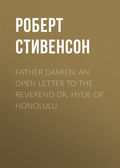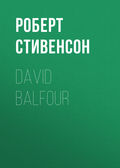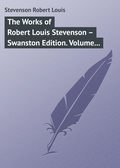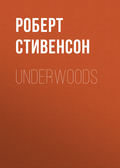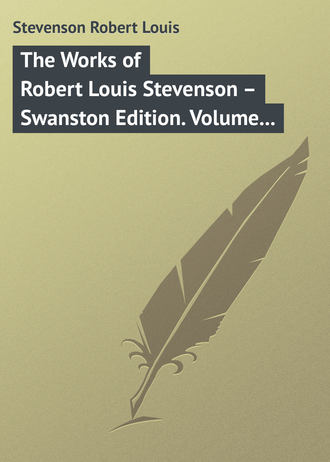
Роберт Льюис Стивенсон
The Works of Robert Louis Stevenson – Swanston Edition. Volume 11
“Hout!” said he. “It shows me ye can bribe; but I’m no’ to be bribit.”
“We’ll see about that yet a while,” says I. “And first, I’ll show you that I know what I am talking. You have orders to detain me here till after Thursday, 21st September.”
“Ye’re no’ a’thegether wrong either,” says Andie. “I’m to let ye gang, bar orders contrair, on Saturday, the 23rd.”
I could not but feel there was something extremely insidious in this arrangement. That I was to reappear precisely in time to be too late would cast the more discredit on my tale, if I were minded to tell one; and this screwed me to fighting point.
“Now then, Andie, you that kens the world, listen to me, and think while ye listen,” said I. “I know there are great folks in the business, and I make no doubt you have their names to go upon. I have seen some of them myself since this affair began, and said my say into their faces too. But what kind of a crime would this be that I had committed? or what kind of a process is this that I am fallen under? To be apprehended by some ragged John-Hielandmen on August 30th, carried to a rickle of old stones that is now neither fort nor gaol (whatever it once was) but just the gamekeeper’s lodge of the Bass Rock, and set free again, September 23rd, as secretly as I was first arrested – does that sound like law to you? or does it sound like justice? or does it not sound honestly like a piece of some low, dirty intrigue, of which the very folk that meddle with it are ashamed?”
“I canna gainsay ye, Shaws. It looks unco under-hand,” says Andie. “And werena the folk guid sound Whigs and true-blue Presbyterians I would hae seen them ayont Jordan and Jeroozlem or I would have set hand to it.”
“The Master of Lovat’ll be a braw Whig,” says I, “and a grand Presbyterian.”
“I ken naething by him,” said he. “I hae nae trokings wi’ Lovats.”
“No, it’ll be Prestongrange that you’ll be dealing with,” said I.
“Ah, but I’ll no’ tell ye that,” said Andie.
“Little need when I ken,” was my retort.
“There’s just the ae thing ye can be fairly sure of, Shaws,” says Andie. “And that is that (try as ye please) I’m no’ dealing wi’ yoursel’; nor yet I amna goin’ to,” he added.
“Well, Andie, I see I’ll have to speak out plain with you,” I replied. And I told him so much as I thought needful of the facts.
He heard me out with serious interest, and when I had done, seemed to consider a little with himself.
“Shaws,” said he at last, “I’ll deal with the naked hand. It’s a queer tale, and no’ very creditable, the way you tell it; and I’m far frae minting that is other than the way that ye believe it. As for yoursel’, ye seem to me rather a dacent-like young man. But me, that’s aulder and mair judeecious, see perhaps a wee bit further forrit in the job than what ye can dae. And here is the maitter clear and plain to ye. There’ll be nae skaith to yoursel’ if I keep ye here; far frae that, I think ye’ll be a hantle better by it. There’ll be nae skaith to the kintry – just ae mair Hielantman hangit – Gude kens, a guid riddance! On the ither hand, it would be considerable skaith to me if I would let you free. Sae, speakin’ as a guid Whig, an honest freen’ to you, and an anxious freen’ to my ainsel’, the plain fact is that I think ye’ll just have to bide here wi’ Andie an’ the solans.”
“Andie,” said I, laying my hand upon his knee, “this Hielantman’s innocent.”
“Ay, it’s a peety about that,” said he. “But ye see, in this warld, the way God made it, we canna just get a’thing that we want.”
CHAPTER XV
BLACK ANDIE’S TALE OF TOD LAPRAIK
I have yet said little of the Highlanders. They were all three of the followers of James More, which bound the accusation very tight about their master’s neck. All understood a word or two of English; but Neil was the only one who judged he had enough of it for general converse, in which (when once he got embarked) his company was often tempted to the contrary opinion. They were tractable, simple creatures; showed much more courtesy than might have been expected from their raggedness and their uncouth appearance, and fell spontaneously to be like three servants for Andie and myself.
Dwelling in that isolated place, in the old falling ruins of a prison, and among endless strange sounds of the sea and the sea-birds, I thought I perceived in them early the effects of superstitious fear. When there was nothing doing they would either lie and sleep, for which their appetite appeared insatiable, or Neil would entertain the others with stories which seemed always of a terrifying strain. If neither of these delights were within reach – if perhaps two were sleeping and the third could find no means to follow their example – I would see him sit and listen and look about him in a progression of uneasiness, starting, his face blenching, his hands clutched, a man strung like a bow. The nature of these fears I had never an occasion to find out, but the sight of them was catching, and the nature of the place that we were in favourable to alarms. I can find no word for it in the English, but Andie had an expression for it in the Scots from which he never varied.
“Ay,” he would say, “it’s an unco place, the Bass.”
It is so I always think of it. It was an unco place by night, unco by day; and these were unco sounds, of the calling of the solans, and the plash of the sea and the rock echoes, that hung continually in our ears. It was chiefly so in moderate weather. When the waves were any way great they roared about the rock like thunder and the drums of armies, dreadful but merry to hear; and it was in the calm days that a man could daunt himself with listening – not a Highlandman only, as I several times experimented on myself, so many still, hollow noises haunted and reverberated in the porches of the rock.
This brings me to a story I heard, and a scene I took part in, which quite changed our terms of living, and had a great effect on my departure. It chanced one night I fell in a muse beside the fire and (that little air of Alan’s coming back to my memory) began to whistle. A hand was laid upon my arm, and the voice of Neil bade me to stop, for it was not “canny musics.”
“Not canny?” I asked. “How can that be?”
“Na,” said he; “it will be made by a bogle and her wanting ta heid upon his body.”13
“Well,” said I, “there can be no bogles here, Neil; for it’s not likely they would fash themselves to frighten solan geese.”
“Ay?” says Andie, “is that what ye think of it? But I’ll can tell ye there’s been waur nor bogles here.”
“What’s waur than bogles, Andie?” said I.
“Warlocks,” said he. “Or a warlock at the least of it. And that’s a queer tale, too,” he added. “And if ye would like, I’ll tell it ye.”
To be sure we were all of the one mind, and even the Highlander that had the least English of the three set himself to listen with all his might.
THE TALE OF TOD LAPRAIK
My faither, Tam Dale, peace to his banes, was a wild sploring lad in his young days, wi’ little wisdom and less grace. He was fond of a lass and fond of a glass, and fond of a ran-dan; but I could never hear tell that he was muckle use for honest employment. Frae ae thing to anither, he listed at last for a sodger, and was in the garrison of this fort, which was the first way that ony of the Dales cam to set foot upon the Bass. Sorrow upon that service! The governor brewed his ain ale; it seems it was the warst conceivable. The rock was proveesioned frae the shore with vivers, the thing was ill-guided, and there were whiles when they büt to fish and shoot solans for their diet. To crown a’, thir was the Days of the Persecution. The perishin’ cauld chalmers were a’ occupeed wi’ sants and martyrs, the saut of the yerd, of which it wasna worthy. And though Tam Dale carried a firelock there, a single sodger, and likit a lass and a glass, as I was sayin’, the mind of the man was mair just than set with his position. He had glints of the glory of the kirk; there were whiles when his dander rase to see the Lord’s sants misguided, and shame covered him that he should be hauldin’ a can’le (or carrying a firelock) in so black a business. There were nights of it when he was here on sentry, the place a’ wheesht, the frosts o’ winter maybe riving in the wa’s, and he would hear ane o’ the prisoners strike up a psalm, and the rest join in, and the blessed sounds rising from the different chalmers – or dungeons, I would raither say – so that this auld craig in the sea was like a pairt of Heev’n. Black shame was on his saul; his sins hove up before him muckle as the Bass, and above a’, that chief sin, that he should have a hand in hagging and hashing at Christ’s Kirk. But the truth is that he resisted the spirit. Day cam, there were the rousing compainions, and his guid resolves depairtit.
In thir days, dwalled upon the Bass a man of God, Peden the Prophet was his name. Ye’ll have heard tell of Prophet Peden. There was never the wale of him sinsyne, and it’s a question wi’ mony if there ever was his like afore. He was wild’s a peat-hag, fearsome to look at, fearsome to hear, his face like the day of judgment. The voice of him was like a solan’s and dinnled in folk’s lugs, and the words of him like coals of fire.
Now there was a lass on the rock, and I think she had little to do, for it was nae place for dacent weemen; but it seems she was bonny, and her and Tam Dale were very well agreed. It befell that Peden was in the gairden his lane at the praying when Tam and the lass cam by; and what should the lassie do but mock with laughter at the sant’s devotions? He rose and lookit at the twa o’ them, and Tam’s knees knoitered thegether at the look of him. But whan he spak, it was mair in sorrow than in anger. “Poor thing, poor thing!” says he, and it was the lass he lookit at, “I hear you skirl and laugh,” he says, “but the Lord has a deid shot prepared for you, and at that surprising judgment ye shall skirl but the ae time!” Shortly thereafter she was daundering on the craigs wi’ twa-three sodgers, and it was a blawy day. There cam a gowst of wind, claught her by the coats, and awa’ wi’ her, bag and baggage. And it was remarkit by the sodgers that she gied but the ae skirl.
Nae doubt this judgment had some weicht upon Tam Dale; but it passed again, and him nane the better. Ae day he was flyting wi’ anither sodger-lad. “Deil hae me!” quo’ Tam, for he was a profane swearer. And there was Peden glowering at him, gash an’ waefu’; Peden wi’ his lang chafts an’ luntin’ een, the maud happit about his kist, and the hand of him held out wi’ the black nails upon the finger-nebs – for he had nae care of the body. “Fy, fy, poor man!” cries he, “the poor fool man! Deil hae me, quo’ he; an’ I see the deil at his oxter.” The conviction of guilt and grace cam in on Tam like the deep sea; he flang doun the pike that was in his hands – “I will nae mair lift arms against the cause o’ Christ!” says he, and was as gude’s word. There was a sair fyke in the beginning, but the governor, seeing him resolved, gied him his dischairge, and he went and dwallt and merried in North Berwick, and had aye a gude name with honest folk frae that day on.
It was in the year seeventeen hunner and sax that the Bass cam in the hands o’ the Da’rymples, and there was twa men soucht the chairge of it. Baith were weel qualified, for they had baith been sodgers in the garrison, and kennt the gate to handle solans, and the seasons and values of them. Forbye that they were baith – or they baith seemed – earnest professors and men of comely conversation. The first of them was just Tam Dale, my faither. The second was ane Lapraik, whom the folk ca’d Tod Lapraik maistly, but whether for his name or his nature I could never hear tell. Weel, Tam gaed to see Lapraik upon this business, and took me, that was a toddlin’ laddie, by the hand. Tod had his dwallin’ in the lang loan benorth the kirkyaird. It’s a dark, uncanny loan, forbye that the kirk has aye had an ill name since the days o’ James the Saxt and the deevil’s cantrips played therein when the Queen was on the seas; and as for Tod’s house, it was in the mirkest end, and was little likit by some that kenned the best. The door was on the sneck that day, and me and my faither gaed straucht in. Tod was a wabster to his trade; his loom stood in the but. There he sat, a muckle fat, white hash of a man like creish, wi’ a kind of a holy smile that gart me scunner. The hand of him aye cawed the shuttle, but his een was steekit. We cried to him by his name, we skirled in the deid lug of him, we shook him by the shouther. Nae mainner o’ service! There he sat on his dowp, an’ cawed the shuttle and smiled like creish.
“God be guid to us,” says Tam Dale, “this is no’ canny!”
He had jimp said the word, when Tod Lapraik cam to himsel’.
“Is this you, Tam?” says he. “Haith, man! I’m blithe to see ye. I whiles fa’ into a bit dwam like this,” he says; “it’s frae the stamach.”
Weel, they began to crack about the Bass, and which of them twa was to get the warding o’t, and by little and little cam to very ill words, and twined in anger. I mind weel, that as my faither and me gaed hame again, he came ower and ower the same expression, how little he likit Tod Lapraik and his dwams.
“Dwam!” says he. “I think folk hae brunt for dwams like yon.”
Aweel, my faither got the Bass, and Tod had to go wantin’. It was remembered sinsyne what way he had ta’en the thing. “Tam,” says he, “ye hae gotten the better o’ me aince mair, and I hope,” says he, “ye’ll find at least a’ that ye expeckit at the Bass.” Which have since been thought remarkable expressions. At last the time came for Tam Dale to take young solans. This was a business he was weel used wi’, he had been a craigsman frae a laddie, and trustit nane but himsel’. So there was he, hingin’ by a line an’ speldering on the craig face, whaur it’s hieest and steighest. Fower tenty lads were on the tap, hauldin’ the line and mindin’ for his signals. But whaur Tam hung there was naething but the craig, and the sea below, and the solans skirling and flying. It was a braw spring morn, and Tam whustled as he claught in the young geese. Mony’s the time I heard him tell of this experience, and aye the swat ran upon the man.
It chanced, ye see, that Tam keekit up, and he was awaur of a muckle solan, and the solan pyking at the line. He thocht this by-ordinar and outside the creature’s habits. He minded that ropes was unco saft things, and the solan’s neb and the Bass Rock unco hard, and that twa hunner feet were raither mair than he would care to fa’.
“Shoo!” says Tam. “Awa’, bird! Shoo, awa’ wi’ ye!” says he.
The solan keekit doun into Tam’s face, and there was something unco in the creature’s ee. Just the ae keek it gied, and back to the rope. But now it wroucht and warstl’t like a thing dementit. There never was the solan made that wroucht as that solan wroucht; and it seemed to understand its employ brawly, birzing the saft rope between the neb of it and a crunkled jag o’ stane.
There gaed a cauld stend o’ fear into Tam’s heart. “This thing is nae bird,” thinks he. His een turnt backward in his heid and the day gaed black about him. “If I get a dwam here,” he thocht, “it’s by wi’ Tam Dale.” And he signalled for the lads to pu’ him up.
And it seemed the solan understood about signals. For nae sooner was the signal made than he let be the rope, spried his wings, squawked out loud, took a turn flying, and dashed straucht at Tam Dale’s een. Tam had a knife, he gart the cauld steel glitter. And it seemed the solan understood about knives, for nae suner did the steel glint in the sun than he gied the ae squawk, but laigher, like a body disappointit, and flegged aff about the roundness of the craig, and Tam saw him nae mair. And as sune as that thing was gane, Tam’s held drapt upon his shouther, and they pu’d him up like a deid corp, dadding on the craig.
A dram of brandy (which he went never without) broucht him to his mind, or what was left of it. Up he sat.
“Rin, Geordie, rin to the boat, mak’ sure of the boat, man – rin!” he cries, “or yon solan’ll have it awa’,” says he.
The fower lads stared at ither, an’ tried to whillywha him to be quiet. But naething would satisfy Tam Dale, till ane o’ them had startit on aheid to stand sentry on the boat. The ithers askit if he was for down again.
“Na,” says he, “and neither you nor me,” says he, “and as sune as I can win to stand on my twa feet we’ll be aff frae this craig o’ Sawtan.”
Sure eneuch, nae time was lost, and that was ower muckle; for before they won to North Berwick Tam was in a crying fever. He lay a’ the simmer; and wha was sae kind as come speiring for him but Tod Lapraik! Folk thocht afterwards that ilka time Tod cam near the house the fever had worsened. I kenna for that; but what I ken the best, that was the end of it.
It was about this time o’ the year; my grandfaither was out at the white fishing; and like a bairn, I büt to gang wi’ him. We had a grand take, I mind, and the way that the fish lay broucht us near in by the Bass, whaur we forgathered wi’ anither boat that belanged to a man Sandie Fletcher in Castleton. He’s no’ lang deid neither, or ye could speir at himsel’. Weel, Sandie hailed.
“What’s yon on the Bass?” says he.
“On the Bass?” says grandfaither.
“Ay,” says Sandie, “on the green side o’t.”
“Whatten kind of a thing?” says grandfaither. “There canna be naething on the Bass but just the sheep.”
“It looks unco like a body,” quo’ Sandie, who was nearer in.
“A body!” says we, and we nane of us likit that. For there was nae boat that could have broucht a man, and the key o’ the prison yett hung ower my faither’s heid at hame in the press bed.
We keept the twa boats closs for company, and crap in nearer hand. Grandfaither had a gless, for he had been a sailor, and the captain of a smack, and had lost her on the sands of Tay. And when we took the gless to it, sure eneuch there was a man. He was in a crunkle o’ green brae, a wee below the chaipel, a’ by his lee-lane, and lowped and flang and danced like a daft quean at a waddin’.
“It’s Tod,” says grandfaither, and passed the gless to Sandie.
“Ay, it’s him,” says Sandie.
“Or ane in the likeness o’ him,” says grandfaither.
“Sma’ is the differ,” quo’ Sandie. “Deil or warlock, I’ll try the gun at him,” quo’ he, and broucht up a fowling-piece that he aye carried, for Sandie was a notable famous shot in a’ that country.
“Haud your hand, Sandie,” says grandfaither; “we maun see clearer first,” says he, “or this may be a dear day’s wark to the baith of us.”
“Hout!” says Sandie, “this is the Lord’s judgments surely, and be damned to it!” says he.
“Maybe ay, and maybe no,” says my grandfaither, worthy man! “But have you a mind of the Procurator Fiscal, that I think ye’ll have forgathered wi’ before,” says he.
This was ower true, and Sandie was a wee thing set ajee. “Aweel, Edie,” says he, “and what would be your way of it?”
“Ou, just this,” says grandfaither. “Let me that has the fastest boat gang back to North Berwick, and let you bide here and keep an eye on Thon. If I canna find Lapraik, I’ll join ye, and the twa of us’ll have a crack wi’ him. But if Lapraik’s at hame, I’ll rin up the flag at the harbour, and ye can try Thon Thing wi’ the gun.”
Aweel, so it was agreed between them twa. I was just a bairn, an’ clum in Sandie’s boat, whaur I thocht I would see the best of the employ. My grandsire gied Sandie a siller tester to pit in his gun wi’ the leid draps, bein’ mair deidly again bogles. And then the ae boat set aff for North Berwick, an’ the tither lay whaur it was and watched the wanchancy thing on the brae-side.
A’ the time we lay there it lowped and flang and capered and span like a teetotum, and whiles we could hear it skelloch as it span. I hae seen lassies, the daft queans, that would lowp and dance a winter’s nicht, and still be lowping and dancing when the winter’s day cam in. But there would be folk there to hauld them company, and the lads to egg them on; and this thing was its lee-lane. And there would be a fiddler diddling his elbock in the chimney-side; and this thing had nae music but the skirling of the solans. And the lassies were bits o’ young things wi’ the reid life dinnling and stending in their members; and this was a muckle, fat, creishy man, and him fa’n in the vale o’ years. Say what ye like, I maun say what I believe. It was joy was in the creature’s heart; the joy o’ hell, I daursay: joy whatever. Mony a time I have askit mysel’, why witches and warlocks should sell their sauls (whilk are their maist dear possessions) and be auld, duddy, wrunkl’t wives, or auld, feckless, doddered men; and then I mind upon Tod Lapraik dancing a’ thae hours by his lane in the black glory of his heart. Nae doubt they burn for it in muckle hell, but they have a grand time here of it, whatever! – and the Lord forgie us!
Weel, at the hinder end, we saw the wee flag yirk up to the mast-heid upon the harbour rocks. That was a’ Sandie waited for. He up wi’ the gun, took a deleeberate aim, an’ pu’d the trigger. There cam a bang and then ae waefu’ skirl frae the Bass. And there were we, rubbin’ our een and lookin’ at ither like daft folk. For wi’ the bang and the skirl the thing had clean disappeared. The sun glintit, the wund blew, and there was the bare yerd whaur the Wonder had been lowping and flinging but ae second syne.
The hale way hame I roared and grat wi’ the terror of that dispensation. The grawn folk were nane sae muckle better; there was little said in Sandie’s boat but just the name of God; and when we won in by the pier, the harbour rocks were fair black wi’ the folk waitin’ us. It seems they had fund Lapraik in ane of his dwams, cawing the shuttle and smiling. Ae lad they sent to hoist the flag, and the rest abode there in the wabster’s house. You may be sure they likit it little; but it was a means of grace to severals that stood there praying in to themsel’s (for nane cared to pray out loud) and looking on thon awesome thing as it cawed the shuttle. Syne, upon a suddenty, and wi’ the ae dreidfu’ skelloch, Tod sprang up frae his hinderlands and fell forrit on the wab, a bluidy corp.
When the corp was examined the leid draps hadna played buff upon the warlock’s body; sorrow a leid drap was to be fund; but there was grandfaither’s siller tester in the puddock’s heart of him.
Andie had scarce done when there befell a mighty silly affair that had its consequence. Neil, as I have said, was himself a great narrator. I have heard since that he knew all the stories in the Highlands; and thought much of himself, and was thought much of by others, on the strength of it. Now Andie’s tale reminded him of one he had already heard.
“She would ken that story afore,” he said. “She was the story of Uistean More M’Gillie Phadrig and the Gavar Vore.”
“It is no sic a thing,” cried Andie. “It is the story of my faither (now wi’ God) and Tod Lapraik. And the same in your beard,” says he; “and keep the tongue of ye inside your Hielant chafts!”
In dealing with Highlanders it will be found, and has been shown in history, how well it goes with Lowland gentlefolk; but the thing appears scarce feasible for Lowland commons. I had already remarked that Andie was continually on the point of quarrelling with our three Macgregors, and now, sure enough, it was to come.
“Thir will be no words to use to shentlemans,” says Neil.
“Shentlemans!” cries Andie. “Shentlemans, ye Hielant stot! If God would gie ye the grace to see yoursel’ the way that ithers see ye, ye would throw your denner up.”
There came some kind of a Gaelic oath from Neil, and the black knife was in his hand that moment.
There was no time to think; and I caught the Highlander by the leg, and had him down, and his armed hand pinned out, before I knew what I was doing. His comrades sprang to rescue him, Andie and I were without weapons, the Gregara three to two. It seemed we were beyond salvation, when Neil screamed in his own tongue, ordering the others back, and made his submission to myself in a manner the most abject, even giving me up his knife, which (upon a repetition of his promises) I returned to him on the morrow.
Two things I saw plain: the first, that I must not build too high on Andie, who had shrunk against the wall and stood there, as pale as death, till the affair was over; the second, the strength of my own position with the Highlanders, who must have received extraordinary charges to be tender of my safety. But if I thought Andie came not very well out in courage, I had no fault to find with him upon the account of gratitude. It was not so much that he troubled me with thanks, as that his whole mind and manner appeared changed; and as he preserved ever after a great timidity of our companions, he and I were yet more constantly together.



